

Seattle Cosmic convened again in miniature form on 12 May 2001 at its backup location, Marty and Ron's house in Kent, Washington. Present were only four people: Marty and Ron "Your Humble Scribe" Hale-Evans, Tim Higgins, and Karl Erickson. We played two games: New Eleusis and The Princes of Florence.
Several Seattle Cosmic members had their appetites whetted for Robert Abbott's card game of inductive reasoning, New Eleusis, after playing the similar Icehouse game, Zendo, two weeks ago. Unfortunately, of those Zendo players, only Karl and I were able to make it this week.
The rules for New Eleusis are available online, but I will describe them briefly here. New Eleusis simulates the scientific method. Players take turns pretending to be God (or Nature, if you like) and devising a "law of nature": a secret rule that any cards played by the Scientists (the other players) must follow. The object is to have the highest score at the end of the game. Scientists are penalised for wrong guesses. Occasionally, a Scientist will declare him- or herself Prophet, and speak for God; if God disagrees with the Prophet's judgments, the Prophet is overthrown as a False Prophet, and cannot be Prophet again that round. Because of the scoring mechanism, it's best for God to find a rule that is easy for some players and hard for others.
We referred mostly to David Matuszek's excellent rules summary (see above), but regarded Bob Abbott's year 2000 elucidation of the rules as authoritative. Bob visited Seattle Cosmic's pages a few months ago, and when I ordered my own copy of the rules and one of his books, he was generous enough to send us a stack of New Eleusis pamphlets for the group. Since he just printed them last year, I'm sure he still has some available at his homepage, www.LogicMazes.com.
Karl was our first God, His rule was "Face card previously, next card red. Non-face card [previously], next card black." Unfortunately, none of the Scientists had the slightest clue what the rule was. Marty asked, "Can we call this game 'Elude-us'?", and after a particularly long string of "no" answers to our guesses from Karl, she observed, "A wrathful god is Karl."
Scores for the round when Karl was God:
Karl .... 10 Tim ..... 10 Marty ... 0 Ron ..... 7
(Usually, the Scientists count the cards in their hands, then score the "high count" minus the cards in their own hand. Marty had 20 cards, so she scored 20 - 20 = 0. Tim had 10, so he scored 20 - 10 = 10. I had 13, so I scored 7. God usually scores the highest Scientist's score.)
Tim was God next. His rule was that any card played must be the same as or higher than the last card played from that suit, except after a face card in that suit, after which the suit was considered to have "wrapped" and any card in that suit could be played -- but then cards in that suit had to be the same or higher, as usual.
As a rule of thumb, the rule you invent is always much harder to guess than you, God, think it is. No one could guess what Tim's rule was, so there was once again no Prophet. Here are the scores from Tim's round:
Karl .... 3 Tim ..... 3 Marty ... 0 Ron ..... 0
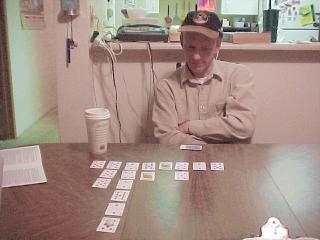
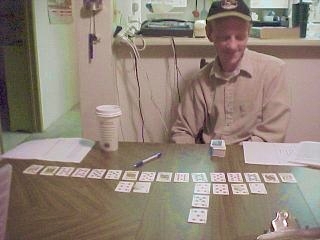
Above you can see a frowning Tim playing a Scientist on Karl's round, and a smiling Tim playing God on his own round. These photos illustrate what Marty called "the universal truth that it's more fun to be God than a confused mortal." Here's Marty offering a card to Tim, Our Lord in Heaven:
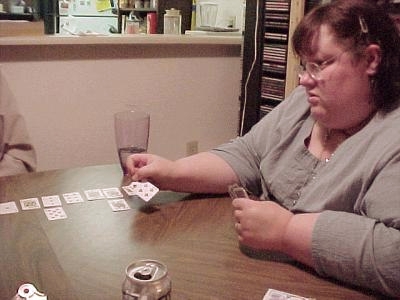
Marty was Goddess next. Her rule was, "Only odd red [cards] and even black [cards] are OK." Karl was pretty sure he knew the rule, and proffered a sequence of three cards at once, in an effort to empty his hand. Goddess smote him, however, and plagued him with six cards (twice what he offered up) in return. But Karl was not to be deterred. He declared himself Prophet at the end of his next turn, and enjoyed a run of a few cards with Marty's blessing, only to be cast down as a False Prophet on Tim's second turn afterwards. Karl still believed he knew the rule, and offered two cards on his next turn. Marty pressed the SMITE button, however, and a torrent of frogs rained down on him (along with four more cards. Doh!). By this time, Karl was beginning to resemble one of those scientific cranks who believe in the Hollow Earth and whom no amount of evidence can dissuade.
At the end of the round, Karl told us his guess: "If the difference between the card played and the previous card is even, play the same colour; otherwise, play the opposite colour." A far cry from "odd red, even black"! Epicycles upon epicycles. Poor Karl.
Actually, although Karl would have done quite badly on this round, and the other three of us pretty well, we forgot to score the round before we reshuffled the cards. I say again: Doh!
Everyone thought Marty had a great rule. But next up was the Great God Ron, and my rule was less than universally popular when I revealed it. It was simply, "The numbers on the cards form the prime numbers starting with 2 (in base 10, of course)." In addition, I verbally stipulated that face cards, jokers, and 10s counted as 0, and gave the hint, "Think like an alien", because of the importance of prime numbers in SETI research (more on this below).
This rule proved to be impossible for anyone except Marty, who guessed it as soon as she saw the cards "2, 3, 5, 7...". She declared herself Prophet ("Pythoness?" I asked, and she replied, "Yes, Monty"). She racked up great big ol' piles of points. Good going, Marty!
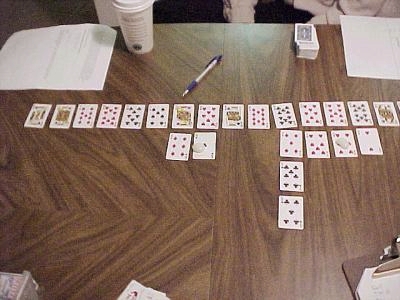
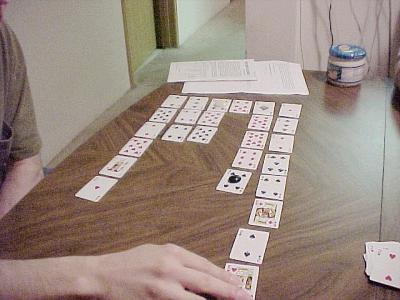
In my own defense, I will cite the heuristic in Bob Abbott's pamphlet, "In general it can be noted that more restrictive rules (ones that allow about one-fourth of the cards to be played at any one time) are easier to discover than less restrictive rules (ones that allow half or more of the cards to be played at any one time)." (See the two photos above. The top row of cards is made up of God's initial card and the Scientists' correct guesses; the columns of cards below the "main line" are incorrect guesses.) Since my rule was the only rule that anyone guessed, and I gave a hint (which no one else did), I don't feel too guilty. Still, when mortals bitch atcha, I agree with the Russian SF writers, the Brothers Strugatsky: It's Not Easy Being God.
Scores for the final round were as follows:
Karl .... 0 Tim ..... 0 Marty ... 59 Ron ..... 34
This meant the scores for the whole game (ignoring the round when Marty was God) came out as follows:
Marty ... 59 Ron ..... 41 Karl .... 13 Tim ..... 13
As for the importance of prime numbers in SETI (the Search for Extra-Terrestrial Intelligence), I thought this was common knowledge among intelligent, educated people (certainly the other three players fall into this category!), or at least science fiction fans (Karl and Marty are, and although I'm still getting to know Tim, it's a fair guess that anyone who owns the original Eon Cosmic Encounter plus almost every expansion is an SF fan). Marty pointed out later that there is actually a scene in the hit movie Contact of a couple of years ago in which SETI researcher Jody Foster determines the radio signals she is receiving come from an intelligent source because they encode the first prime numbers.
Here is a puzzle based on an actual 23-page radio message humans recently beamed toward some local stars that seem likely to have life-bearing planets. Can you solve it?
Tim didn't enjoy New Eleusis, and Karl didn't enjoy it as much as he'd hoped to. But four players is about the minimum needed to play New Eleusis; it is usually recommended that you play with more. We thought more players might bring more and different kinds of guesses into play, which might have a synergistic effect on the other players. Anyway, I loved it, and Marty said she found it interesting, and wanted to play Zendo for comparison.
It's funny; the only other time Marty and I have played New Eleusis, it was also in a four-player game. We played one game around 1988 with our friend Moses Klein and a mutual acquaintance from the Net named Daniel Loeb. I later found out (through the Net, of course!) that Daniel went on to make a name for himself in Diplomacy circles (a.k.a. "The Hobby" -- that is, the Avalon Hill game, not international intrigue), and is now researching combinatorial game theory at the University of Bordeaux, France.
Around 10pm we wrapped up New Eleusis (we started around 7pm, so a four-player game took around three hours) and set up The Princes of Florence, which Tim brought. (I have a German edition that Marty gave me for Christmas, but the time never seemed right to inflict that much German text on the rest of the gang. Maybe now we've played it in English... Eh?)
There is a variety of play aids and rule sets for the German edition (in English) online, and play is complicated, so I'll limit myself to a few brief comments herein and therein. The big idea is that you play a prince in Renaissance Italy, founding a city-state that will attract great artists, and funding their great works of art. The greater the works of art your artists produce, the more prestige it brings your city, and therefore you. The winner is the prince with the most prestige at the end of the game.
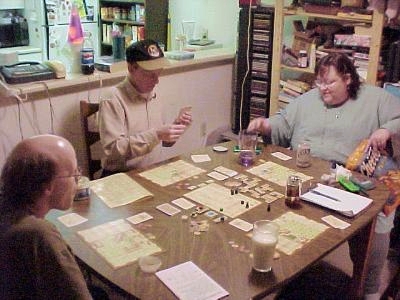
There are seven rounds in the game, and each has an Auction Phase and an Action Phase. (I turned to Marty and told her she couldn't play in the Action Phase "because it doesn't have you in it". This caused some confusion.) In the Auction Phase, you bid on important resources. Sometimes you try to get your opponents to waste money on them in a bid war. (Didn't Renaissance Italy have auction-sniping software?) In the Action Phase, you can build buildings, establish freedoms, landscape your grounds (artists produce better if they have studios, libraries, universities, freedom of speech, forests in which they can walk and think, and so on). You can also attempt to "milk" one of your stable of artists, to produce a great work of art that will bring you boffo box office and bucketfuls of bucks, er, Florins.
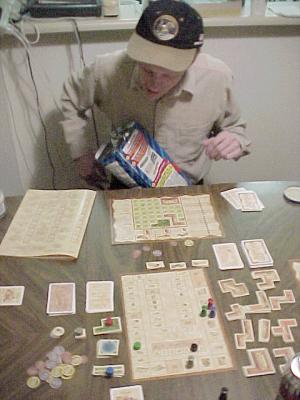
Notice in the photo above, Karl's grey piece is way ahead of the red (Tim), blue (Marty), and green (me) pieces on the scoreboard in the center. He thought he was so hip -- but Prince Carlo's city became passé fast.
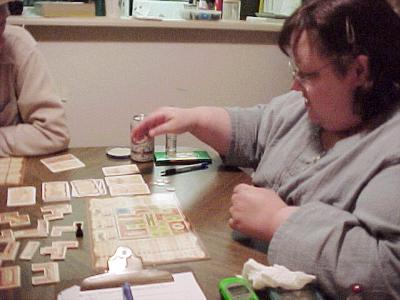
One of the more interesting parts of this game for me is that the buildings and chunks of landscape you place on your board come in the shape of various polyominoes -- they look sort of like pieces in Tetris (which uses tetrominoes, or polyominoes made of four squares). If you build and landscape often, or are simply careless, you may find yourself running out of room on your board, so spatial ability and skill with polyomino puzzles can come in handy. Below we see Prince Carlo, whose avocation in real life is geometry, deciding where to fit his latest acquisition.
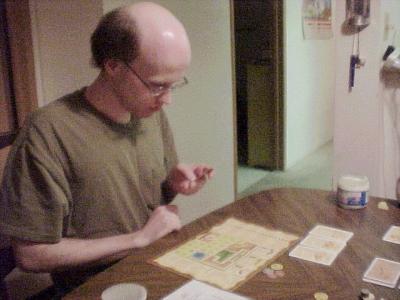
One thing you can offer your artists and scientists is freedom, in various flavours: Freedom of Opinion, Freedom of Religion, and Freedom of Travel. It was most economical for me to offer my staff only freedom of opinion, so Marty said, "We don't care what you think in San Ronaldo, as long as you go to church and don't leave."
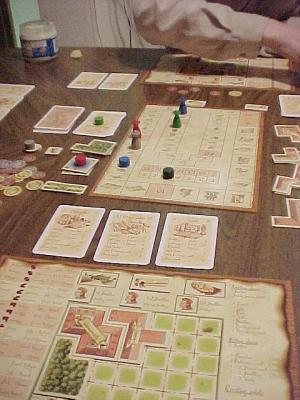
Above is the Princes of Florence setup from my perspective. My green piece is way ahead of everybody else's (heh heh). I started out slowly -- I don't think I scored any prestige points on my first turn at all, unlike Tim, Marty, and especially Karl -- but I sussed out pretty fast that once you get a certain amount of money from your artists' work, you should "burn" the rest of your money and convert it to prestige points. I was the first person to find that out this game; next game I won't be so lucky.
You can see the figure-eight-shaped University in the upper left of my compound above. I had a Bonus Card that made my artists' works considerably more valuable if I hired a bunch of jesters (artists love comedy, apparently), so I bought three, more than anyone else in the game. Marty, who might have cut me a freakin' break after she won the SETI rule in New Eleusis, claimed that I was actually starting a Clown College! Since there's nowhere else to put them on the board, I moved the three jesters to my University (see below).
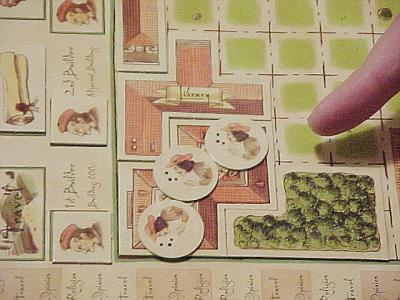
By this time, Karl, who had started out so far ahead, was now almost equally far behind. The rest of the royalty savoured the rich irony. "We're not laughing at you, Karl," I told him. "We're laughing at your pitifully unhip city-state."
Final scores for the game were as follows (in prestige points):
Ron ..... 62 Tim ..... 50 Marty ... 47 Karl .... 45
Notwithstanding his lowly rank in the eyes of his fellow Renaissance princes, and despite the fact that he usually prefers abstract games to themed ones (and does a lot betterat them), Karl said he enjoyed the game and it was changing his mind about resource management games, a genre of which he had never been too fond. Tim, who owned the game, thought there was too little interaction between players. Marty said she thought the theme was charming. So did I, and I thanked my lucky stars (although I didn't have an astrologer on my staff) that there was so little player interaction, because in games with a lot of it, like Cosmic Encounter, I usually go great guns at the beginning, then get put in my place (that is, last) with leader-bashing from everyone else.
I guess since I had the highest prestige, I was the Fresh Prince of Florence. Here's a photo of me looking smug toward the end of the game when it became obvious I was going to win (with a little something added by Marty):
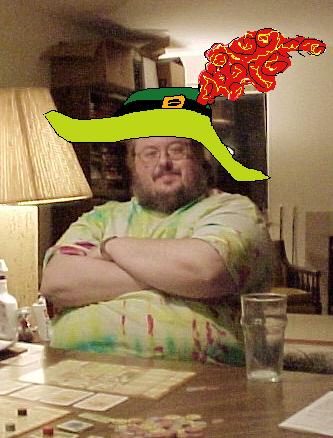
After we cleaned up The Princes of Florence, Tim showed us a few other recent German games he had brought along (Java, Serenissima, and Tigris & Euphrates). He is eager to play them at future game nights, and left them for us to try out. Thanks, Tim!
Robert Abbott, the creator of New Eleusis, read this page and had a few comments on our New Eleusis game (also on Zendo). Here is my correspondence with him:
Date: Thu, 17 May 2001 16:09:50 -0400 From: Robert Abbott <RobtAbbott@att.net> To: Ron Hale-Evans <rwhe@ludism.org> Subject: Re: Seattle Cosmic plays New Eleusis Dear Ron: Sorry your Eleusis game wasn't a big success. In my opinion, Karl's rule was okay. It should have been discovered, but maybe only by a group that has played the game at least once before. Tim's rule was pretty much impossible. Most people wouldn't think to look back to the last card played of the same suit. And then playing higher until you reach a face card is also hard to see. Marty's rule was pretty good. Your own rule sounded pretty good and the hint you gave was interesting. But if you didn't get the rule after 2,3,5,7 then I don't see how you could ever get it. Did you go to two-digit numbers, so next should be ace-ace? That's very confusing. I recently had my own disastrous experience with Eleusis. I acted as dealer to demonstrate it to some quite intelligent people and none of them had the least notion of what the rule was. I've come to the conclusion that the first time you play the game you should use an EXTREMELY simple rule, something on the order of red-black-red-black. Maybe that's TOO simple, so a good first rule would be odd-even-odd-even (that's a little harder because people don't normally think of parity in relation to playing cards). I think that whenever I reprint my booklet, I'll add something about this. Maybe I'll put something on my web site. It would be okay, wouldn't it, to have a link to your game night write-up? I don't know what to think about Zendo. I read the write-up and it sounded interesting, but I'll probably never play it because I don't have ice house pieces and don't plan on buying them. What did you think of the Buddhist crap in the write-up? It annoyed the hell out of me, even though I knew it wasn't necessary to the game. I've seen various puzzle programs that have a lot about Buddha in them. I think I'd rather listen to some asshole talk about how Jesus has changed his life than listen to some kid go on about Buddha. Of course, as you know, I've been rooting for the goddess worshipers to take over. Best, Bob Abbott From rwhe Thu May 17 13:18:48 2001 Date: Thu, 17 May 2001 13:18:48 -0700 To: Robert Abbott <RobtAbbott@att.net> Subject: Re: Seattle Cosmic plays New Eleusis Bob-- By all means, add a link to our N.E. game to your site. As far as I'm concerned, no one need ever ask permission to link to my pages (or any public web pages). Email is another matter. May I forward your email to our list? I don't think it will offend anyone there. I'll answer your email in more detail shortly. Ron From rwhe Thu May 17 13:45:58 2001 Date: Thu, 17 May 2001 13:45:58 -0700 To: Robert Abbott <RobtAbbott@att.net> Subject: Re: Seattle Cosmic plays New Eleusis (contd.) On Thu, May 17, 2001 at 04:09:50PM -0400, Robert Abbott wrote: > Dear Ron: > > Sorry your Eleusis game wasn't a big success. > > In my opinion, Karl's rule was okay. It should have been > discovered, but maybe only by a group that has played the game at > least once before. Hmm... Marty and I had both played it once before, in the late 80s. > Tim's rule was pretty much impossible. Most people wouldn't > think to look back to the last card played of the same suit. And > then playing higher until you reach a face card is also hard to > see. Yeah, it was pretty complicated. > Marty's rule was pretty good. We all thought so! > Your own rule sounded pretty good and the hint you gave was > interesting. But if you didn't get the rule after 2,3,5,7 then I > don't see how you could ever get it. Did you go to two-digit > numbers, so next should be ace-ace? That's very confusing. Thanks. Yes, that's what I meant by "base 10". Ace-ace, ace-3, ace-7... I kept hoping if they looked long enough at the 2,3,5,7 part, it would dawn on them. The people I played with are smart! > I recently had my own disastrous experience with Eleusis. I > acted as dealer to demonstrate it to some quite intelligent > people and none of them had the least notion of what the rule > was. I've come to the conclusion that the first time you play > the game you should use an EXTREMELY simple rule, something on > the order of red-black-red-black. Maybe that's TOO simple, so a > good first rule would be odd-even-odd-even (that's a little > harder because people don't normally think of parity in relation > to playing cards). I think that whenever I reprint my booklet, > I'll add something about this. Maybe I'll put something on my > web site. It would be okay, wouldn't it, to have a link to your > game night write-up? As I mentioned, link away! The Zendo guy says something along the same lines -- the first rule should be something like "Every koan must contain a red pyramid" or something. But one of the weird things about Zendo is that the Master can deliberately deceive the Students by making his koan LOOK really complex. John's example koan had all kinds of color and size symmetry, and it fooled us for a long time, when all his rule said was "A koan must contain at least 5 pyramids." > I don't know what to think about Zendo. I read the write-up and it > sounded interesting, but I'll probably never play it because I don't > have ice house pieces and don't plan on buying them. You can buy a set of paper Icehouse pieces adequate for Zendo for around $3.00 at www.funagain.com. They're not as pretty as the plastic pieces, and won't last as long, but they're an order of magnitude less expensive. > What did you > think of the Buddhist crap in the write-up? It annoyed the hell out > of me, even though I knew it wasn't necessary to the game. I've > seen various puzzle programs that have a lot about Buddha in them. > I think I'd rather listen to some asshole talk about how Jesus has > changed his life than listen to some kid go on about Buddha. Of > course, as you know, I've been rooting for the goddess worshipers to > take over. I have mixed feelings about it. I was a Zen Buddhist myself for about seven years. In retrospect, it reminds me of what John Lennon said about Jesus: "Jesus was all right, but his followers are thick and ordinary." Zen literature is full of sayings of Zen masters such as "Zen is nothing special" and "Buddha is a dried shit-stick" (the ancient equivalent to toilet paper). It's the Zen *students* who tend to be a pain in the ass. Zen even has an expression for the state of consciousness of someone who yammers on and on about Buddha, annoying everyone around: that person "stinks of Zen". But it seems to me that the Zen flavour of the Zendo rules is somewhat loose and irreverent. Zendo is nothing like Zen practise, really; you may try to figure out koans, but you don't bug Zen masters about whether koans have Buddha-Nature or not, unless you've really twisted yourself into some kind of mental knot. So in the end, it seems to me that Kory Heath has done with Zen more or less what you have done with Judeo-Christianity and its "God" and "Prophets": used it for colour, but not taken it too seriously. In fact, just as your game might offend a Christian, I can imagine Zendo offending someone who has "the stink of Zen." Best, Ron Date: Thu, 17 May 2001 17:01:46 -0400 From: Robert Abbott <RobtAbbott@att.net> To: Ron Hale-Evans <rwhe@ludism.org> Subject: Re: Seattle Cosmic plays New Eleusis (contd.) Yes, feel free to send my e-mail on to anyone. You can also put it on your site if you want. Thanks for your comments about Buddhism. I guess you sat that my game actually did offend Christians, as I mentioned on my site when I talked about the "Bicycle Offical Rules of Card Games" -- Bob
The Center for Ludic Synergy and Seattle Cosmic Game Night are now associates of Funagain Games. This means that 5% of your purchase there goes toward supporting us if you buy games via the following links or the Funagain logo at the bottom of the page.
Even if you don't want to buy the games, the Funagain pages often contain lengthy, useful game reviews.
Saturday, 19 May 2001, 7:00 PM in West Seattle. Come play for fun and FABULOUS PRIZES!
Remember, game nights are every Saturday at 7:00 PM, at Dave and Kathy's house in West Seattle. Please bring a snack or drink to share (cookies, chips, soda, juice, etc.).

Seattle Cosmic Game Night Home | Center for Ludic Synergy home
All photos on this page copyright © 2001 by Ron Hale-Evans except where otherwise noted.
Maintainer: Ron Hale-Evans, rwhe@ludism.org
Page last updated 21 May 2001.